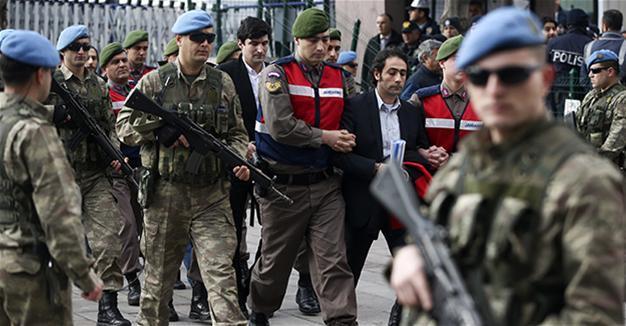Order to remain in barracks would have outed coup bid: Turkish commander
ANKARA

AA photo
The failed July 2016 coup would have been revealed immediately if personnel had been ordered to stay in their military barracks on that day, Special Forces Commander Lt. Gen. Zekai Aksakallı has said in his testimony as a witness into the killing of anti-coup soldier Ömer Halisdemir, who has been idolized for his actions during a raid on the Special Forces Command in Ankara.
“In the Turkish Armed Forces (TSK), an order saying ‘Personnel shouldn’t leave their military barracks’ is given in crises and extraordinary situations as soon as the situation is heard of. The unit commanders continue their work in the barracks. This simple and basic rule that is always applied wasn’t applied on July 15, 2016, when the attempt was first heard of. If it had been applied, then the coup attempt would have come to light at the beginning,” Aksakallı said March 17 when asked which measures could have been adopted at the Special Forces Command after information regarding the coup was shared.
On March 20, the Ankara 14th Court of Serious Crimes continued with the trials of 18 suspects in the case regarding the murder of non-commissioned officer Halisdemir, who shot pro-coup general Semih Terzi after the latter arrived at the command to capture it as part of the coup on July 15, 2016. Halisdemir was subsequently killed by putschists.
According to his testimony, Aksakallı arrived at the General Staff Headquarters on July 15, 2016, in order to participate in a meeting on the fight against terror. Noting that Terzi did not participate in the meeting citing his father’s health condition, Aksakallı said a note was delivered to Deputy Chief of the General Staff Gen. Yaşar Güler at around 4 p.m., after which he left the meeting.
A note was then delivered to the Land Forces Chief of Staff, after which Aksakallı realized that something was wrong.
“After both of them left the meeting, I also left and went to the command floor. I asked an official in the hall about where our Deputy Chief of the General Staff was. He told me that he was with Chief of General Staff Gen. Hulusi Akar and [Turkey’s National Intelligence Agency] MİT head Hakan Fidan. Something was wrong, but I couldn’t figure out what it was,” Aksakallı said.
Noting that he entered the meeting once again, Aksakallı said it ended at around 7 p.m. but that a meeting on the command floor between Güler and Akar was continuing.
Aksakallı also said he talked to Halisdemir eight times on the phone on the night of the thwarted coup.
“In our last conversation, because he was a soldier I trusted and we found out that Terzi was going to the Special Forces Headquarters, I told Halisdemir that Terzi was a traitor and a coup plotter and ordered him to kill Terzi,” he said.
In his testimony Aksakallı said he was in contact with different military units during the events and that he went to the Special Forces Headquarters at 10 a.m. on July 16, 2016.
“When I went there, I saw the coup plotting soldiers under custody. I thanked the soldiers who detained them. Halisdemir’s dead body was at the entrance of the headquarters. A blanket was on him. I lifted it and kissed him on his forehead,” he said.
Aksakallı, in his former capacity as major general, played a key role in the defeat of the attempted coup after realizing that his deputy, Terzi, was an active member of the junta.
Terzi was actually in charge of the special ops along the Syria border. He was not supposed to be in Ankara on the night of the coup attempt but came to raid and seize the Special Forces HQ near the city.
Aksakallı became trapped inside the Special Forces HQ as the plot was underway, after which he phoned his bodyguard, Halisdemir, who was outside the building. According to his own testimony, Aksakallı told Halisdemir that Terzi was a traitor and said Halisdemir should stop him from entering the building at the expense of his own “martyrdom,” if necessary.
As soon as he received these orders, Halisdemir confronted the soldiers advancing toward the building with Terzi. He ordered them to stop but they instead sprayed him with bullets, killing him on the spot.
